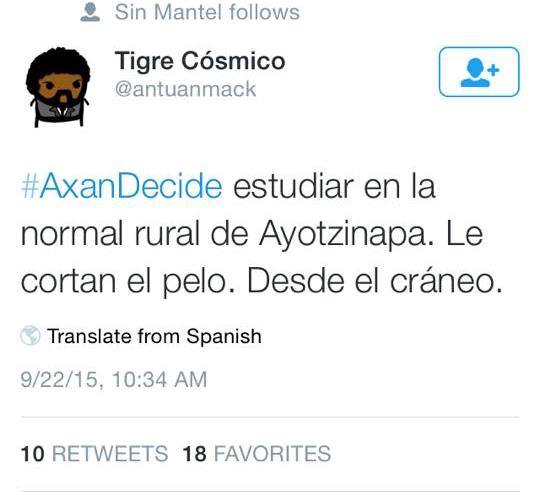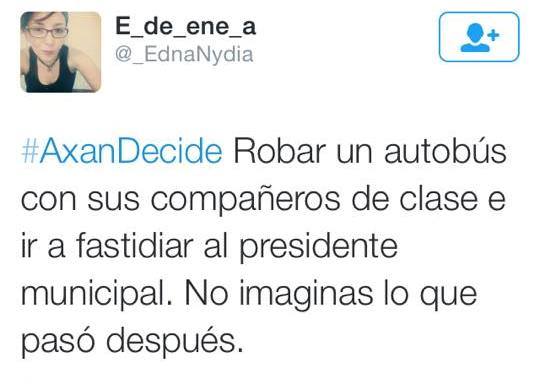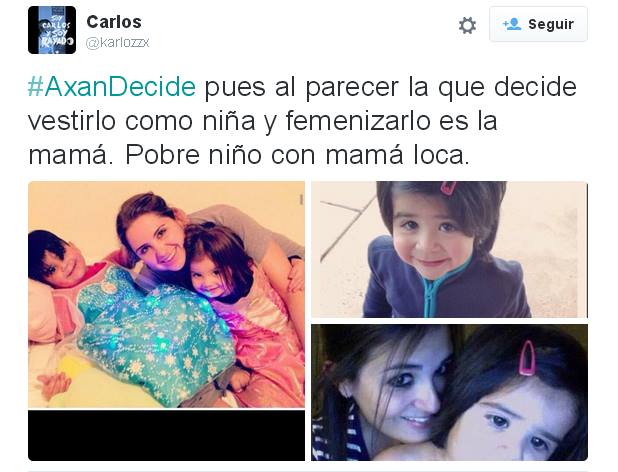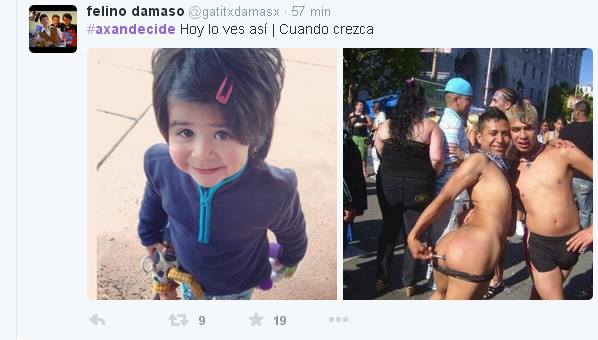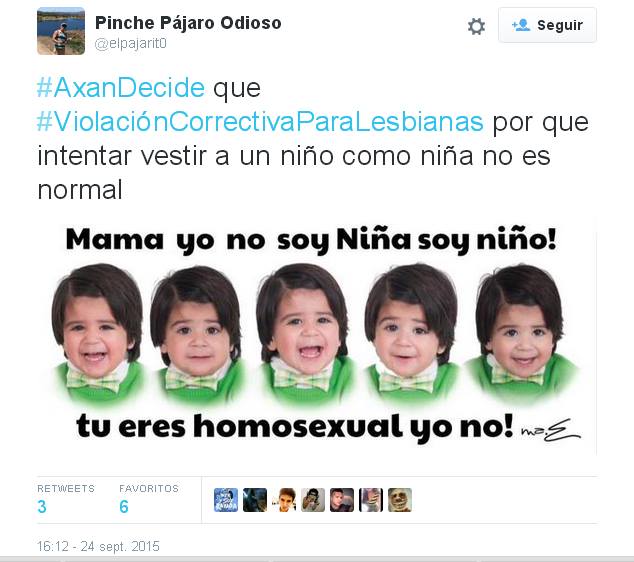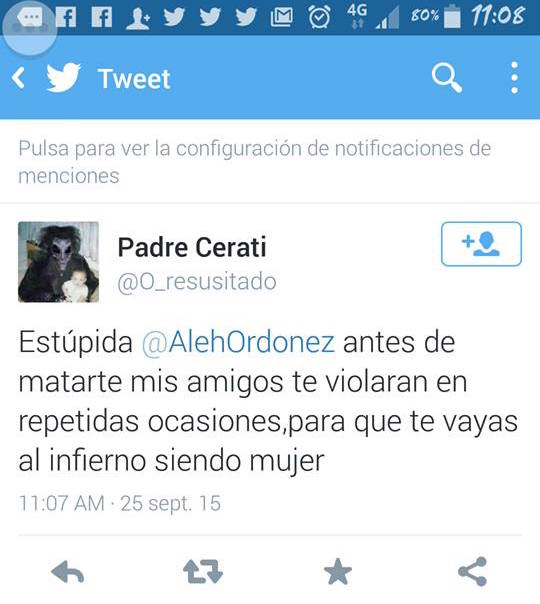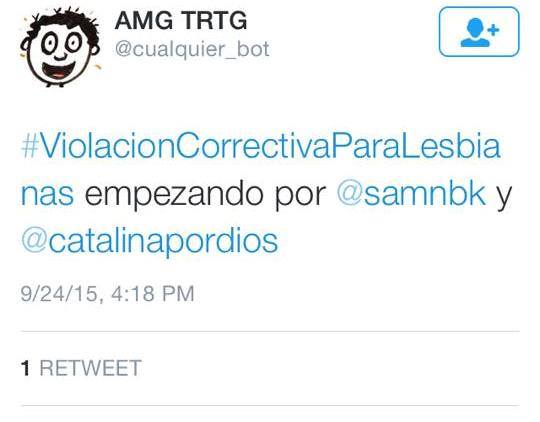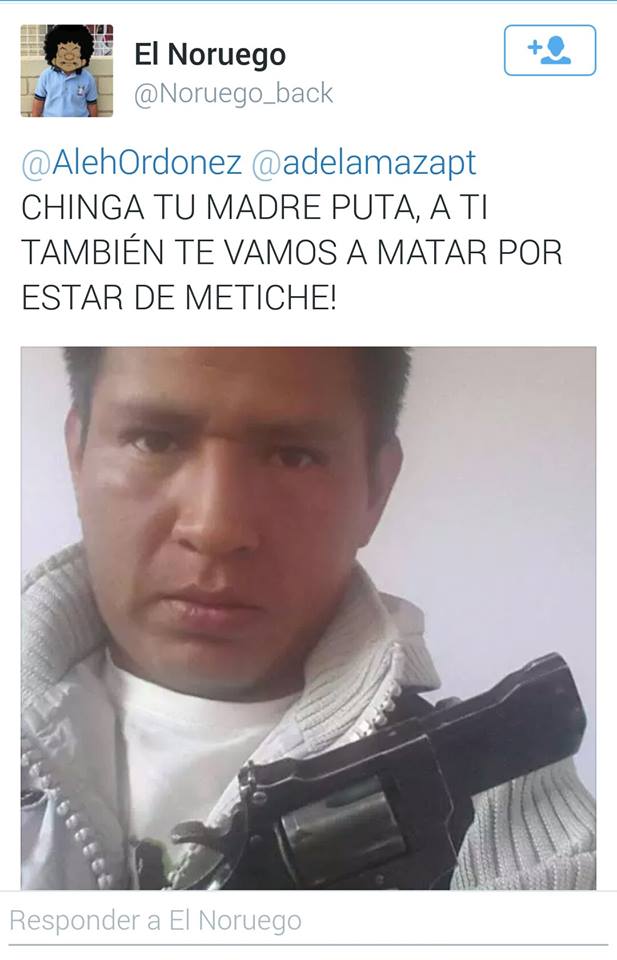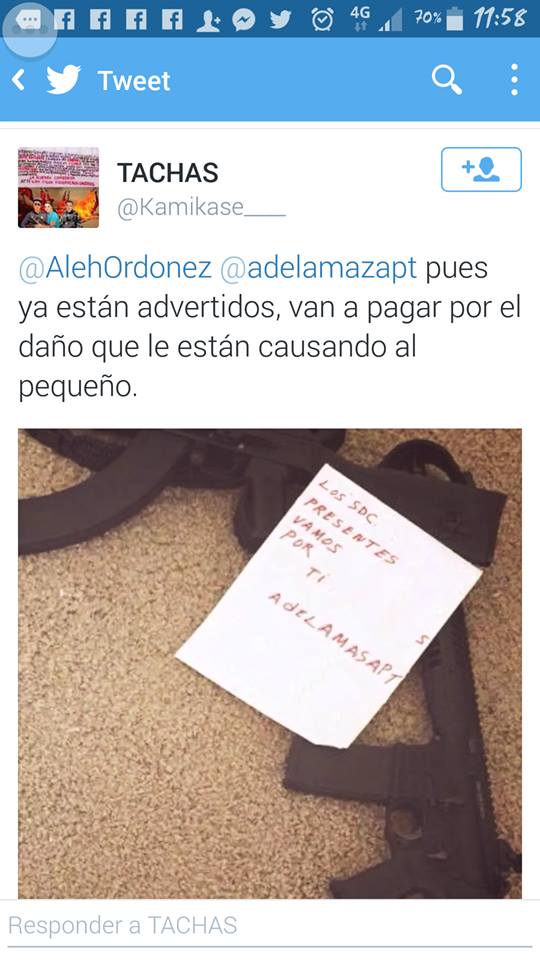Trolls and access to rights: the #AxanDecide case
by Digital Rights LAC on October 27, 2015
By claiming his son’s right to education, a mother has being exiled and threatened with death. Trolls are to blame. That’s right.
By Catalina Ruiz-Navarro (@catalinapordios)
Axan is a four years old child who lives in Hermosillo City, Sonora State, Mexico and he cannot study. In despite that in Mexico there are a thousand reasons why a child, male or female, has difficulties to access proper education, Axan is being denied access to it by the most stupid of all excuses: his long hair. Axan doesn’t want to get a haircut. “It’s one of the first decisions that he has made over his own body”, her mother A. de la Maza told, who has being teaching him about the importance of personal autonomy.
Even though the Mexican Constitution guarantees Axan his right to education, free development of his personality, and to not be discriminated against because of his gender, the school rulebook becomes something that is not only unfair but dangerous.
How many private institutions violate human rights under the argument that they have their own ruling? Why etiquette, manners and arbitrary rules seem more important than human rights?
With this questions in mind, Axan’s mother went to the relevant authorities: National Council to Prevent Discrimination (CONAPRED), Executive Victim Attention Committee (CEAV) and the Sonora State’s Education and Culture Department. In addition she made a petition on the Change.org platform. A discussion arises and several articles were written as a consequence, such as Schools free of gender stereotypes and Societies free of gender stereotypes on Estefania Vela’s blog in El Universal; an interview with Axan’s mother on Vice, Flashback 80’s and Axan FAQ and Axan’s mirror on Animal Politico, and my own column on Sin Embargo, among others.
And along came the trolls.
First of all, people cannot understand why the mother doesn’t simply forces her child to follow stupid rules. The passion with which people defends the obligation to follow absurd rules is brutal.
Apparently, if you assume a critical posture, Mexican State will disappear you: one could assume by the quantity of tweets linking not getting a haircut with the tragic fate of 43 teachers-in training disappeared a year ago. The message sent with their disappearance is loud and clear: obey or be gone. People reminds it Axan’s mother.
Then they found out that Axan comes from a single-parent household, meaning that his mother chose to have him by her own, and even worse, A. de la Maza is a lesbian.
Then, cybernauts begin to “claim” that Axan’s mother want to “turn” him into a woman, “making” him wear long hair. They start digging Axan’s pictures in social networks, they pick those where he is wearing a hair brooch to “confirm” that he is being crossdressed (even tho he is wearing pants and a shirt). Being woman or gay is reduced to wearing a brooch on the head.
After that, trolling escalates. Threats regarding “corrective rape” against Axan’s mother, nonetheless.
Rape threats expands to women who wrote about the case like Estefanía Vela and myself, including the lawyer carrying Axan’s case, Aleh Ordóñez.
Then, threats are accompanied with fire arms pictures.
There’s also the picture of a firearm besides a handwritten piece of paper that singles out Axan’s mother. After an image search on the Internet, the pictures appear to be created specially for this threats, they are not rehassed or taken from any drug dealer’s account or anything like that.
This is no longer an issue about a disagreement online or a debate about school regulations. Now there are mexican citizens using social network to deliver death threats to a woman who is fighting for her son’s right to an education. Those threats spread to all the people who supports the mother, whom, to no one’s surprise, are also women. Worst of all: the threats are to “protect” Axan from his own mom.
The president of the Sonora’s Human Rights State Department (CEDH), Raúl Ramírez said that, obviously, the school is obliged to take Axan back, and with long hair! “It’s in fact discrimination, even tho there’s a contract signed Human Rights are inalienable”, said Ramírez. Nevertheless, the CEDH president’s declarations doesn’t restore nor guarantee Axan’s rights, whom situation became even more complex:
Because of death and corrective rape threats, the continuous rumors of “We are going to report you to the DIF (Integral Family Development System) so they will take your son away”, A. de la Maza had to temporarily leave Hermosillo. She cannot even go and live somewhere else where they can, in fact, exercise their rights: it’s about the rights given by the Constitution to all of Mexico’s boys and girls. That’s why today Axan and his mother cannot be here nor there, they are in a temporary forced displacement because of Internet misogyny. And all caused by her fending his son’s right to an education and a free personality development.
On the Internet as well as on three dimensional spaces it is frowned upon and it’s threatening that women talk in public and defend their rights. Women are allowed to speak in public to be victimized, but not to take a critical stance against society. Women who invite other women to speak up are double dangers. That’s why a mother who mobilizes to claim her son’s right to an education is well perceived as long as she’s doing it as a victim and without questioning society.
Misogyny, trolls, and hate speech
Internet misogyny has a pretty definitive structure: there’s a special fury in attacks against women and those threats spread quickly to their families and/or sexuality -rape threats for example-. They also attack women sexual morality, stating that a woman cannot speak because she’s a whore, tends to promiscuity, she’s a lesbian or frigid (there’s no way out). There are also attacks against women’s intelligence or reasoning, we are brutes, crazy, we cannot understand, we cannot see the “big picture”.
This elements are constant in every troll speech against women on the Internet (you may read about other cases I’ve written about here and here, and also an article from Fundación Karisma here) and they are a real problem because Internet misogyny effectively attacks our freedom of speech and our access to basic rights. Just like what happened to Axan.
How to regulate trolls’ hate speech? Death or corrective rape threats are not part of freedom of speech: is hate speech. This kind of discourse attacks a person or group of people based on attributes such as gender or race and incites violent actions against them, a discourse that is not protected. If there is any doubt regarding the difference between an insult or hate speech, there’s a simple test: if it’s being used to silence someone’s claim to human rights, it’s not freedom of speech.
On the other hand, we don’t have effective regulations: there is no way to asset this threats. Since hate speech is highly emotional and irrational, there is no way of knowing which of this trolls will remain in verbal threats and which have the intent of rape or murder. Judging the the imagery of firearms, we can assume at least that the have the intent and the means to do it. Maybe they never go through with it, but the insecurity and anxiety provoked are enough to make every woman to think twice before saying anything online, and even to think thrice before claiming her rights. The psychosocial damage produced by Internet misogyny attacks cannot be measured in any risk assessment.
On September 24th, the UN released the Online Violence Against Children and Women Report. The report states that Internet misogyny is a pandemic. Points out that in spite of the rapidly growing number of women victimized, barely 26% of 86 countries are taking care of it. It shows that 73% of women say that they have experienced violence online, in a lot of countries women choose not to report it fearing social repercussions and that cyber-violence imposes an additional emotional load that is time and resources consuming.
Undoubtedly, legal and penal mechanisms are insufficient to control the troll problem, that’s why it’s important to have a closer look. Maybe, what’s harder than everything else is that cyber-violence attacks are not taken seriously, as if what happens online is not a part of “real life”. It’s ludicrous to believe that a murder or corrective rape threat can be resolve with a “ignore them, people is crazy”, nevertheless, this is frequently the reaction of public enforcement officials and judges.
“Freedom of speech is a fundamental right and its preservation requires everyone’s surveillance”, states the United Nations report, this means that every cybernaut has a shared responsibility on cyber-violence case. For example, Twitter users have an ethical responsibility to report accounts where the attacks came from.
This is not enough. We could only use Internet incredible potential to fend our rights, in an effective fashion, if we collectively build a space in which people can demand their fundamental rights without being chased. In order to accomplish this, we have to realize that the chasers are not the others: anonymous Twitter accounts, abstracts identities. They are very real people, with very real violence that under the slightest provocation unleash their cannibalism. Online and offline, we are in need of education, sensitization and debate to be able to deal with all of this rage.



